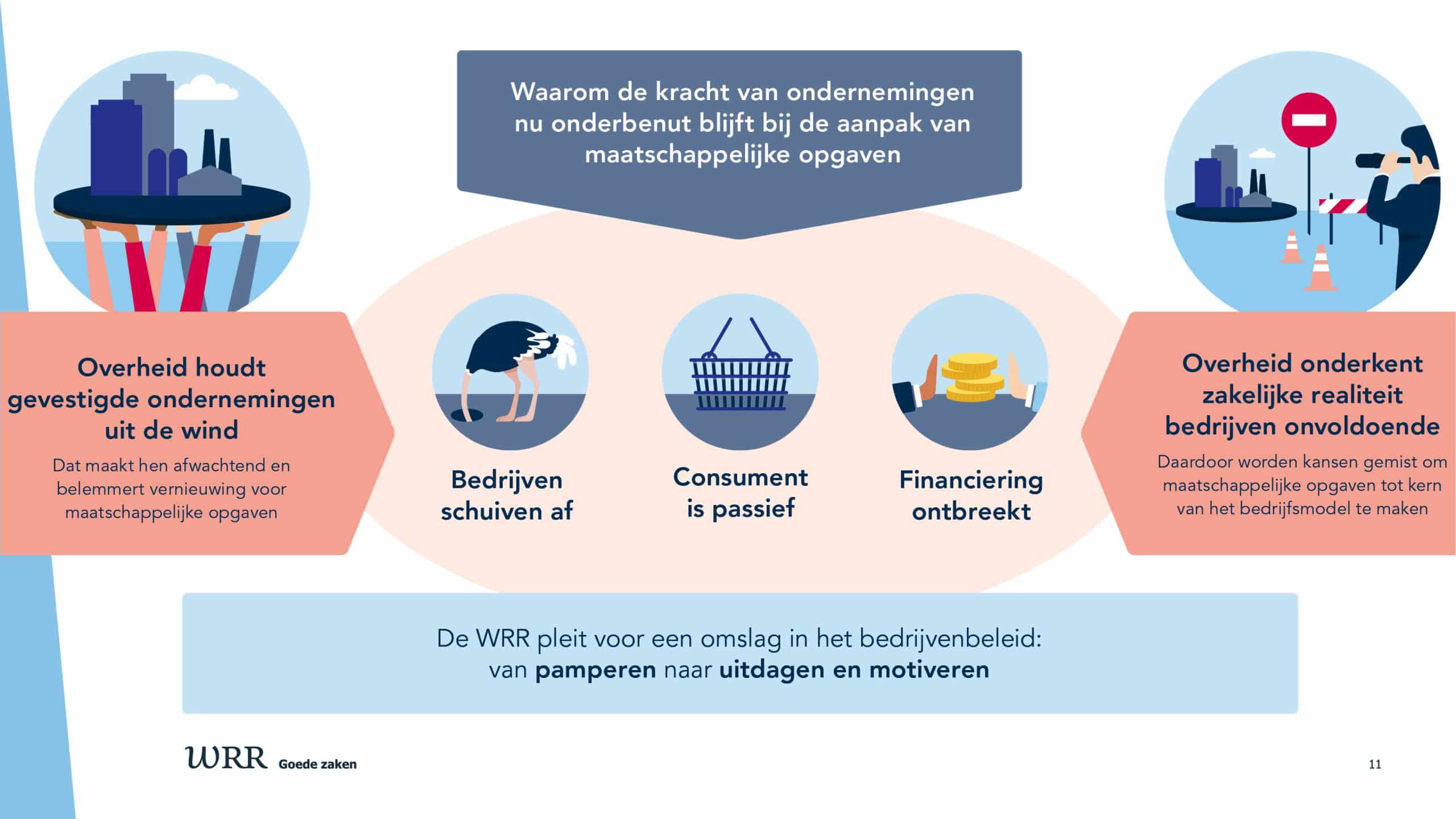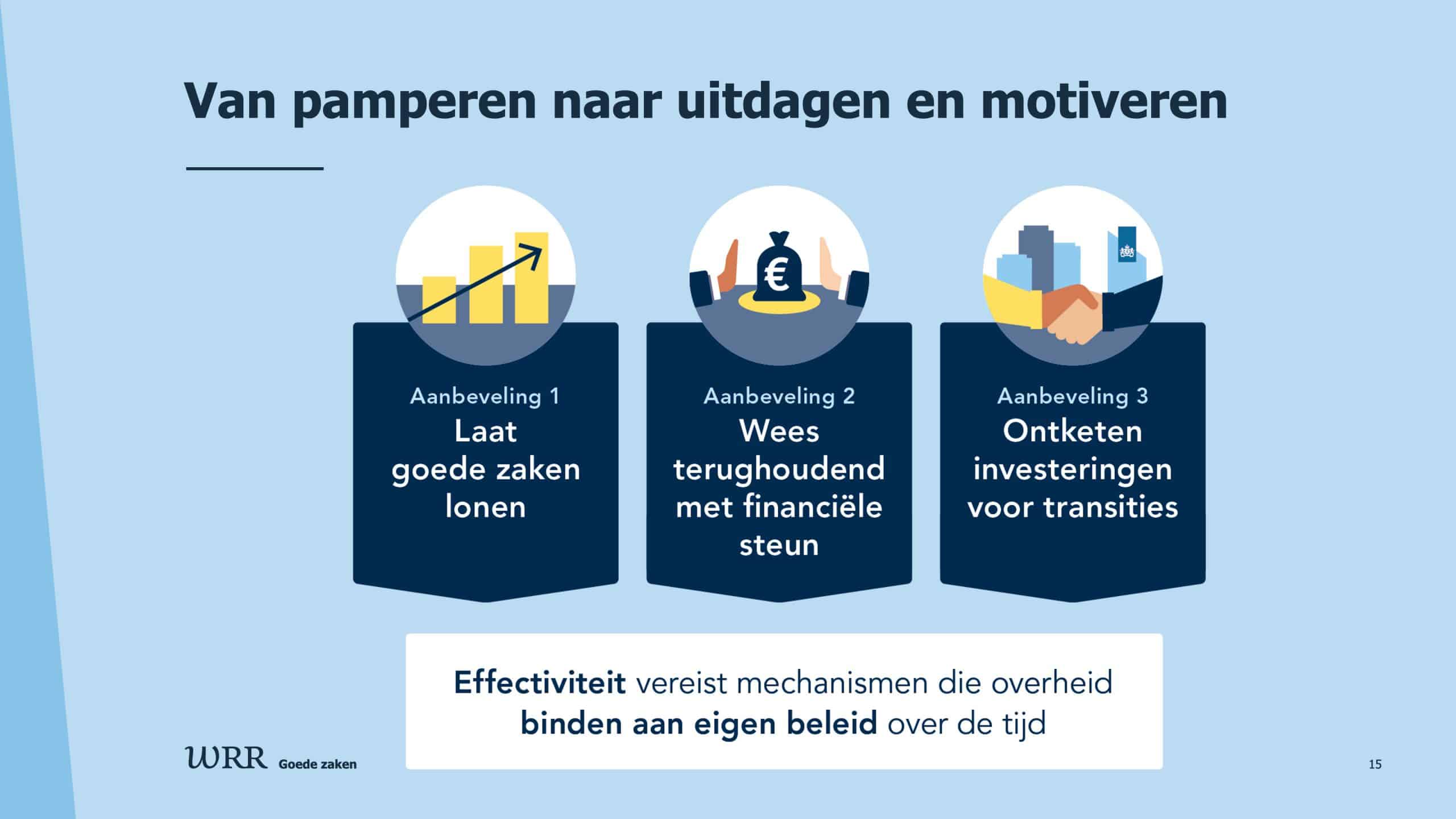Als je alles vastlegt, slaat vernieuwing dood
Op initiatief van Amsterdam Economic Board, ORAM en ROM InWest gingen ondernemers en overheden met elkaar in gesprek over de rol van bedrijven bij oplossingen voor maatschappelijke opgaven zoals gezondheid, arbeidsmarkt, duurzame energie. En wat ze daarbij nodig hebben van de overheid.
Aanleiding van de bijeenkomst is het rapport van de Wetenschappelijke Raad voor het Regeringsbeleid ‘Goede zaken. Naar een grotere maatschappelijke bijdrage van ondernemingen’. Lees het nieuwsbericht over dit rapport.
“De zakelijke realiteit is dat maatschappelijk ondernemen niet loont. Niet duurzame oplossingen zijn goedkoper en de consument kiest niet zomaar bewust. De overheid geeft verkeerde prikkels, pampert het gevestigde bedrijfsleven en het toezicht is te licht.”
– Dr. Marthe Hesselmans, mede-auteur rapport
Klik op de afbeeldingen om ze te vergroten.
Visie op aanbevelingen
UvA-hoogleraar Arnoud Boot, projectvoorzitter van het WRR-rapport, geeft tijdens de bijeenkomst zijn visie op de aanbevelingen uit het rapport.
-
Ontsporende maatregelen
Transities lijken groter in deze tijd, door de enorme verworvenheden die we hebben opgebouwd. We hebben meer te verliezen. Maatregel op maatregel werkt ontsporend voor het bedrijfsleven. De overheid kan sturen op het vergroten van de maatschappelijke verantwoordelijkheid van bedrijven, maar de oplossingen moeten ze niet zelf verzinnen.
-
In gesprek met bedrijven
Gevestigde bedrijven en overheden geven af op elkaar in plaats van in gesprek te gaan, duurzame spelers zitten überhaupt niet aan tafel. Bedrijven moet je niet als paria beschouwen omdat dit politiek handig uitkomt.
-
Juiste investeringen
Financiële instellingen zijn integraal onderdeel van de samenleving, daar moet je mee in gesprek. Een publiek-private bank met ook private aandeelhouders en privaat kapitaal kan ervoor zorgen dat bestaande instrumenten effectief worden ingezet voor maatschappelijke en betaalbare oplossingen en het geld niet voor politieke doeleinden wordt gebruikt. Daarnaast kan het zorgen voor een lange termijn oriëntatie die minder vatbaar is voor politieke wisselingen.
Consistent en werkbaar beleid
Aan de verschillende gesprekstafels wordt vervolgens gereflecteerd op de knelpunten en aanbevelingen uit het rapport. De belangrijkste punten die tijdens de bijeenkomst naar voren kwamen is een lange termijnvisie met lange termijn wet- en regelgeving voor bedrijven met een duidelijk doel, in de pas met de snelheid waarin bedrijven opereren, creatieve oplossingen overlaten aan bedrijven, aanbestedingen met duurzame randvoorwaarden voor een level playing field, toezicht op bijv. milieuvergunningen om perspectief te bieden, consistent beleid voor financiering en geen pilots meer.
Uiteenlopende perspectieven komen in beeld vanuit grootbedrijven, startups, fondsen, intermediaire organisatie, overheden, onderwijsinstellingen, stichtingen en belangenverenigingen. De gevestigde (vaak grotere) bedrijven hebben grote verwachtingen van de steun van de overheid voor het verduurzamen van hun bedrijf en de benodigde financiering. Ook vragen ze om lange termijnbeleid. De overheid moet zelf ook aan de gemaakte afspraken voldoen. Ze benadrukken het belang van een positief vestigingsklimaat voor deze bedrijven.
Mark de Boer, Vice President Sustainability van Albemarle, sprak over hun fabriek in Amsterdam Noord waar de gemeente dichtbij woningen wil bouwen, terwijl er heel duidelijke richtlijnen zijn bij de Vereniging van Nederlandse Gemeenten (VNG) over de afstand van woningen tot bedrijven als Albemarle.
Startups zijn gericht op het laten groeien van hun innovatie/product en het moeten concurreren met aanbieders van minder duurzame/gezonde en vaak goedkopere producten. Via het maken van lange termijn inkoopafspraken met zowel publieke als private partijen proberen ze af te dwingen dat er bij inkoop meer afspraken worden gemaakt over duurzaamheid en gezondheid.
Anouk Snelders, founder Health Food Wall, vertelde dat ondernemers heel goed snappen welke kant we als regio op bewegen. In een aanbesteding kun je aan ondernemers de vraag stellen om te voldoen aan 80% plantaardige voeding. Dan is Health Food Wall een serieuze optie als leverancier van snacks.
Ondernemende overheid
Ondernemers zijn bezig met de dag van morgen. Een ondernemende overheid is nodig die zich verplaatst in bedrijven: snelle implementatie van werkbare regels met een duidelijk doel. De overheid heeft veel kennis, alleen totaal andere tijdspaden. Als startups zich niet ondersteund voelen slaan ze eerder een andere weg in om gezamenlijk oplossingen te organiseren zonder overheid of zoeken zelf (buitenlandse) financiering.
Belangrijkste takeaways
Anders kijken, anders doen
Bedrijven en overheden moeten zich heel anders tot elkaar gaan verhouden. Overheden moeten juist met de vernieuwende spelers in gesprek, zich in elkaar verplaatsen en de overheid moet niet de rol van bedrijven overnemen bij innovatie. Kortom: Anders kijken, anders doen. Zo ontstaat er ruimte voor ondernemers om hun rol te pakken bij creatieve oplossingen voor gezondheid, arbeidsmarkt, duurzame energie.
24 november 2023
Meer weten over
Neem contact op
Blijf jij ook op de hoogte?
8x per jaar nieuws en events uit de regio: schrijf je in voor de Board Update nieuwsbrief
Deel dit artikel
Wil je op de hoogte blijven?
Volg ons dagelijks op LinkedIn en schrijf je in voor de Board Update nieuwsbrief.
Lees ook deze berichten
- Een nieuwe lichting gedreven jongeren is aangetreden bij Young on Board, de ...
- Met de selectie van vier kanshebbers is de regionale voorronde van de ...
- Met meer dan 80 ondernemers, 40 investeerders en diverse dienstverleners bood LSH Capital Match ...



